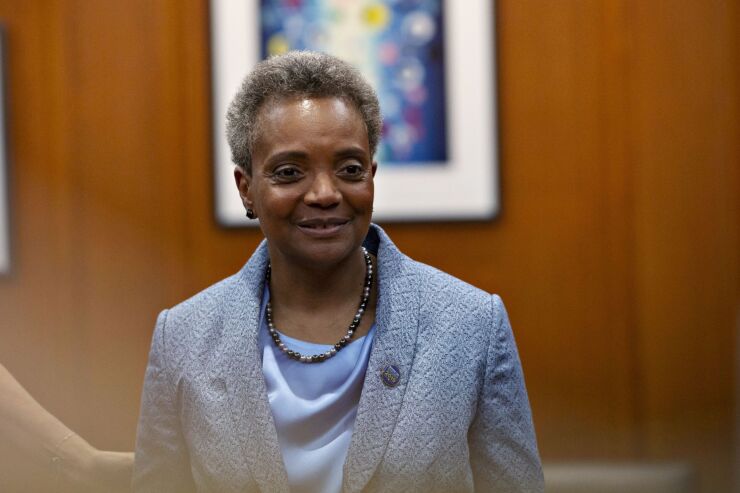Rating agencies and investors don’t share Chicago Mayor Lori Lightfoot’s confidence that the city is well-positioned to manage the potentially deep fiscal wounds COVID-19 might inflict.
“I think we are very well situated,” Lightfoot has said. “We obviously did modeling and thinking about the potential for an economic downturn but the bottom line is it's too early for us to measure the entirety of the impact, but we feel very comfortable where we are both as an economy at large but also in terms of revenue sources for the city of Chicago."

No one revenue stream accounts for more than 13% of the budget and economically sensitive revenues are under 25%, Lightfoot has stressed.
Market participants don’t share that level of confidence in the city's ability to handle a sharp downturn.
“This is a health emergency that is turning into a fiscal emergency for the city,” said Brian Battle, director of trading at Performance Trust Capital Partners. “You can’t fault the mayor for focusing on the health, safety and welfare of citizens. That’s her first calling but I think that posture invites skepticism.”
“We were already in a weakened position. This crisis will be a fiscal burden. How large a fiscal burden will be determined by the magnitude and duration of the quarantine,” Battle, who is based in Chicago, said.
“Chicago's uphill climb has gotten harder with the addition of COVID-19 and recession pressures on a city already struggling to regain structural balance,” S&P Global Ratings analysts Blake Yocom and Jane Ridley wrote in a piece published Thursday about how COVID-19 challenges 10 major cities’ credit quality.
“While Chicago may be able to keep controls on costs, economically sensitive revenues like home-rule and state-shared sales, transaction, transportation, recreation, and state-shared income taxes made up 35% of key operating revenues in fiscal 2018,” S&P wrote.

The city's deeply underfunded pensions weigh heavily.
“Given the magnitude of the problem and reliance on market returns to stay on track with pension funding, it is possible that even if the city takes all the right steps to align expenditures with revenue, the effects from COVID-19 and the recession could still result in credit deterioration,” wrote S&P, which rates Chicago general obligation debt BBB-plus with a stable outlook.
The city has some cushion in its ending balance, $2 billion in available cash, and $100 million in extra savings from a debt refinancing so there’s a liquidity cushion. Debt service is primarily paid from property taxes, but more economically sensitive revenue losses could take a toll.
The finance team, led by chief financial officer Jennie Huang Bennett, has said it’s closely monitoring the financial impact and can adjust spending, if needed.
Market participants agree that the city, like most, can’t yet forecast the expense and revenue hit of the pandemic or the expected recession or the strength of a potential recovery in the second half of 2020.
The federal relief package signed into law late last month will help on the expense side. Chicago and large counties will receive a share of Illinois’ expected $5 billion share of direct aid but revenues and pensions are the stress points.
“Our ratings have stress case and downside scenarios, but this particular situation” has the potential to go far beyond those ranges, said Fitch Ratings' Arlene Bohner, head of U.S. public finance. “This is more like an economic shock. The total shutdown of economic activity is going to impact different credits in different ways.”
The city does have diverse revenue streams but it’s susceptible to hotel, sales, and restaurant tax hits so there will be losses.
“It’s all going to depend on the length and severity of the situation in Chicago and the jury is still out on length. We are assuming nationwide some recovery in third quarter, but that will vary,” Bohner said.
Bohner noted Chicago’s BBB-minus rating reflects a lower resilience to downturns than higher-rated credits. The city has kept in communication with rating agencies. Bohner said she’s spoken several times with Bennett.

While Bohner hesitated to say what actions or lack of action could trigger a downgrade to junk, the rating agency will watch for what the city might draw from its asset lease reserve that holds $550 million from the city’s lease of the Chicago Skyway. The size of a draw and the city’s plan to replenish it would be scrutinized.
Kroll Bond Rating Agency rates the city A and stable and Moody’s Investors Service, which is not asked to rate new deals, assigns the junk rating of Baa1 and a stable outlook.
Buyside representatives stress that the market will show patience in getting numbers from the city and its plans to address any shortfall amid a public health crisis unprecedented in modern times but that patience will last only so long. The city and state are headed toward a peak estimated to arrive later this month with the state reporting 7,695 positive COVID-19 cases as of Thursday including 3,427 in Chicago.
Battle said it would be helpful if the city indicated when it might have revised figures available and lay out options to dealing with various economic scenarios.
“Investors will have patience but it’s limited with credits like Chicago and the state,” Battle said.
The city has not indicated any near-term borrowing plans; until now it has benefitted from a market flush with cash and willing to overlook fiscal ills. That could change given the liquidity that’s been withdrawn from the market and the expectation of a growing focus on credit quality, market participants said.
“The good thing about Chicago is it does have a pretty diverse economic base and that helps but there is a tourism element to the economy and those revenues add up. The city has pension issues being so underfunded to begin with” so there’s stock market risks, said Howard Cure, director of municipal bond research at Evercore Wealth Management, LLC. “I’m also not sure what cooperation the city could get from labor unions” on potential concessions to help control expenses.
“They are going to have to make some tough decisions on raising taxes, making cuts, and the rainy day fund. They are big questions,” Cure said.
Cure said the market will be looking for the city to outline economic stress tests on its budget and plans to address shortfalls. He too said the market would show some patience as the city deals with a “life and death” crisis but as time goes by the fiscal questions will become more “relevant and need to be addressed” especially given the city’s weaker ratings.
“Investors are assessing risk tolerance,” Cure said, noting that future borrowing rates could depend on city actions should investors hesitate to invest in weaker credits in anticipation of a recession.
“It’s too early for us to know at this point what the overall impact will be on the economy for the city and region and as a consequence it’s too early for us to know with any degree with any specificity what if any the impact will be on the city’s budget,” Lightfoot said this week.
Lightfoot has repeated her position on several occasions, most recently on Wednesday after her former mayoral rival Paul Vallas, the city’s budget director and then head of Chicago Public Schools under former Mayor Richard M. Daley, penned an op-ed in the Chicago Tribune with the headline “Chicago needs a wartime financial plan, now.”
“The city of Chicago is facing a code red fiscal crisis,” Vallas wrote.
Lightfoot dismissed the assertion and repeated her position that it’s too early to gauge the damage and the “the suggestion that our city budget is in tatters, is just foolish.”
On the same day, Gov. J.B. Pritzker warned that the state’s proposed fiscal 2021 budget faces a major rewrite.
To preserve its ratings, the city must move toward structural balance, something Bennett has said the city can achieve by 2022, and keep up with its shift to actuarial contributions to its pension system that is just 23% funded.
The city is operating on an $11.65 billion all-funds budget that includes a $4.5 billion corporate fund. The city’s summer fiscal forecast warned of deficits of $1.19 billion and $1.16 billion in 2021 and 2022, respectively, on a baseline forecast that doesn’t account for revenue or expense changes in 2020. Local tax revenues make up about $1.8 billion of the city’s corporate fund and include transportation taxes, recreation taxes, sales, and hotel taxes with about $427 million coming from state income taxes including a portion shared by the state from income taxes and from the personal property replacement tax on corporate income.





